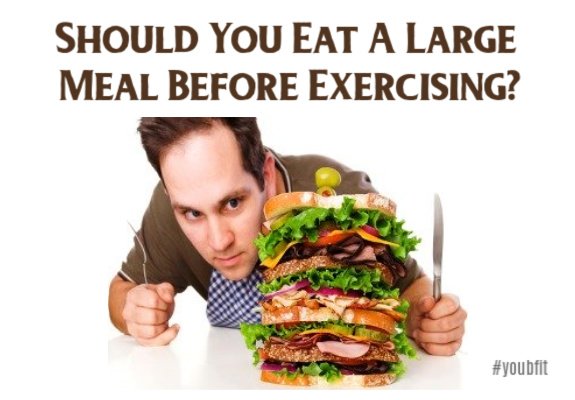Written by: Wallace Merriman

So let’s start with the basics. By eating a healthy, well-considered meal 1-2 hours before exercise, and another healthy, well-considered meal within 1-2 hours after exercise, most people can meet their workout nutrition needs without anything else. In other words, If you’re a healthy person who exercises regularly, you probably don’t need special workout nutrition strategies. Of course, your training needs will differ if you’re working towards being an endurance athlete, bodybuilder, or getting ready for a fitness competition. However, if your focus is on exercise for general health and fitness, weight loss, and maintaining a healthy physique, your main focus should be on quality and quantity.
That means eating more minimally processed proteins, veggies, quality carbs, and healthy fats; ensuring your portions are the right size, and in the right amounts, for you; and eating slowly, until satisfied.
For most people, everyone is stressing out about when to eat their carbs, when to eat their fats and what supplements they need to take in and around their workouts. All of this can be distracting and self-sabotaging.
Your decisions will be different based on your situation. A pre-diabetic office worker who’s never exercised certainly has to decide on different choices from a serious endurance runner or the long-time bodybuilder.
Your pre-exercise needs before exercise can make a big difference in your performance and recovery. Let’s think ahead about three hours before your workout. You want to eat things that will help you sustain energy; boost performance; hydrate; preserve muscle mass; and speed recovery.
Eating some protein a few hours before exercise can help you maintain or even increase your muscle size, reduce muscle damage, and flood the bloodstream with amino acids just when your body needs the most to increase your performance while exercising. That doesn’t mean you should rush off and make a protein shake. The protein shake could be a good idea, but any protein source within a few hours of the workout session will do the trick. Don’t get me wrong, a protein shake will be fine because of the speed of digestion in your system, but it’s not the only thing you can consume.
Eating carbs is also a plus because it helps fuel your training and recovery, preserves muscle and liver glycogen, and stimulates the release of insulin. It’s always a great idea to add a protein and a carbohydrate with your meal. You should also eliminate any sugary carb drinks.
Fats before exercise is not necessary because it doesn’t appear to improve or diminish sports performance. So that’s enough about that.
So let’s talk about what to eat before exercise. With keeping all these things in mind and depending on what suit your individual needs, you can simply have a normal meal in the few hours before the exercise or have a small meal just before the exercise session. If you’re trying to build muscle, you might even want to do both.
Eating 2 to 3 hours before exercise:
Woman:
- One palm of protein-dense foods (chicken, fish).
- One fist of vegetables (broccoli, cauliflower).
- One cupped handful of carb dense foods (mixed fruits, brown rice).
- One thumb of fat dense food (almonds).
Men:
- Two palms of protein-dense foods (chicken, fish).
- Two fists of vegetables (broccoli, cauliflower).
- Two cupped handfuls of carb dense foods (mixed fruits, brown rice).
- Two thumbs of fat dense foods (almonds).
Remember, your actual needs will vary depending on your size, goals, genetics, and the duration and intensity of your activity.
Eating 0-60 minutes before exercise:
Rather than eating a larger meal 2-3 hours before exercise, some people like to eat a smaller meal closer to the session. The only issue with that: the closer you get to your workout, the less time there is to digest. I would recommend something liquid at this time, like a shake or a smoothie.
Here are some quick pick ideas #1:
- One scoop whey protein powder
- One fist of veggies (spinach works great in smoothies)
- 1-2 cupped handfuls of carbs (berries or banana work great)
- One thumb of fats (like flax seeds or avocado)
- A low-calorie beverage like water or unsweetened almond milk
Quick pick ideas #2:
- One scoop chocolate protein powder
- One fist spinach
- One banana
- One thumb peanut butter
- 8 oz. chocolate, unsweetened almond milk
*Always remember to choose pre-training nutritious foods that don’t bother your stomach because you know what will happen if you don’t.
Ok, Ok, here are some examples of balanced pre-workout meals:
If Your Workout Starts Within 2–3 Hours or More
- Sandwich on 100% whole-grain bread, lean protein, and a side salad
- Egg omelet and 100% whole-grain toast topped with avocado spread and a cup of fruit
- Lean protein, brown rice, and roasted vegetables
If Your Workout Starts Within 2 Hours
- Protein smoothie made with milk, protein powder, banana, and mixed berries
- Whole-grain cereal and milk
- A cup of oatmeal topped with banana and sliced almonds
- Natural almond butter and fruit preserve sandwich on 100% whole-grain bread
If Your Workout Starts Within an Hour or Less
- Greek yogurt and fruit
- Nutrition bar with protein and wholesome ingredients
- A piece of fruit, such as a banana, orange or apple
*Keep in mind that you don’t need to eat many pre-workout meals at different times. Just choose one of these. For best results, experiment with different timings and nutrient compositions.
